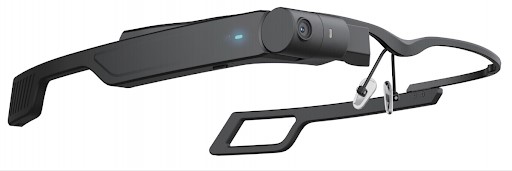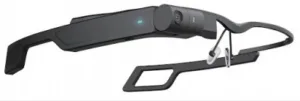Although this article does report on the development of a new smartglasses product, it is more about the company that designed, manufactures and sells the product. The principle reason that Kifta Technologies caught my attention is that it is based in Lagos, Nigeria. Reporting an African-based high technology display company has been uncommon for Display Daily so I thought it would be interesting as a topic for today’s article.

First, about the company. Kifta describes itself as an “integrated defense technology company, founded in 2018, with a mission to be a critical lever in the crucial efforts by African countries to indigenize their capacity to meet their defense needs as they tackle ongoing developmental and security imperatives in the 21st Century. It has, however, through a rigorous product innovation process as well as sizeable research and development investments, developed a spectrum of tested and ready-to-market product prototypes, which cut across a wide range of military, civilian, public and private sector needs.”
A video appended to the end of this article contains a general introduction to the company.
The smart glasses product developed by the Kifta is monocular. It is illustrated in the figure below.
 The Kifta monocular smart glasses.
The Kifta monocular smart glasses.
The features and specifications of the Kifta smart glasses include the following:
- 21 degree field of view
- MicroOLED display
- Resolution 640 x 400
- 2000 nit brightness
- CPU: Movidius (an Intel company) Myriad 2 based on 12 core SHAVE VPUs (vision processing units optimized for machine vision)
- Camera: 13 megapixels CMOS BSI (backside illuminated sensor)
- Rotatable camera – angle maximum 40 degrees with auto focus
- High sensitivity touch key (supporting a glove mode and non-contact operation) voice control and custom key
- Video: 1080P at 30FPS, 720P at 30FPS video record with electronic image stabilization
- Privacy light indicator during recoding
- USB type C port 1.2m with high strength, super soft cable
- Weight: 39g
- Sensor: IMU (Inertial Measurement Unit), compass, ALS (Ambient Light Sensor)
- System: 3s rapidly boot up
- “Ultra-low” power consumption
- Audio: noise reduction with dual microphone directional near field speaker
- Accessories: magnetic lenses (myopic lenses and sunglasses), portable glasses case
Although the smart glasses appear to be in product form, it is more likely that the device is a prototype. In any case, price and delivery information are not currently available.
Next, a bit more about the company.
The Kifta business model is primarily B2B with a focus on African clients. The company does, however, report having many clients from outside the African continent. Sales consists primarily of products but also includes licensing some of the company’s proprietary technologies.
At this time, Kifta has very little manufacturing capability located within Nigeria. At least part of the reason for this is attributed to the unreliability of the power supply in Nigeria. The company explains that the production processes utilized to manufacture their products requires a very steady supply of power and that “even a 1 – 2% voltage increase could damage the whole product if it is not configured correctly.”
Despite these challenges, Kifta has plans to establish a manufacturing facility within Nigeria. Baked into this plan is the recognition that every element in the product might not be made within the country. Apparently the goal is to produce enough of a product in country such that the product can qualify as Nigerian made.
The Kifta smart glasses have the capabilities for facial and license plate recognition and the ability to be connected to a database of people in a company, state or country. One database specifically mentioned in company literature is the National Identity Number database. Stated more generally, features such as recognition software, location search and live transmission could “help Nigerian and other African law enforcement agencies fulfil their duties while keeping them accountable.”
Sounds great but….. the adoption of Kifta smart glasses is reported as having stalled within Nigeria. Monsuru Anifowoshe, the CEO of Kifta, explained that the problem relates to “accessing the right people.”
Up to now, Kifta Technology has been entirely self-financed. That may change in that Kifta plans to raise funds from institutional sources to support some of the company’s future growth. -Arthur Berman

